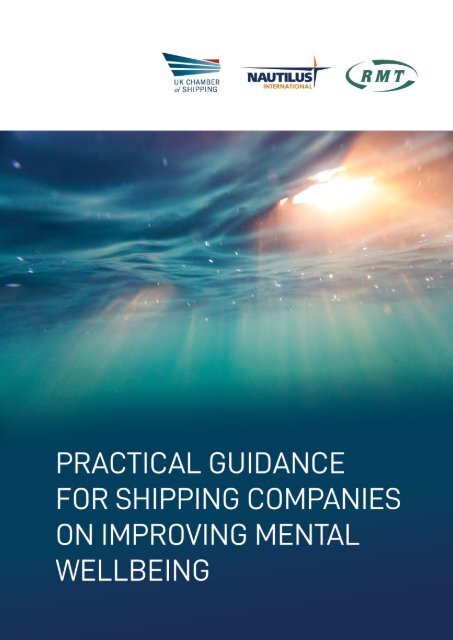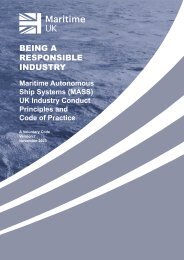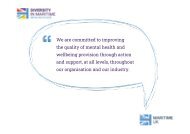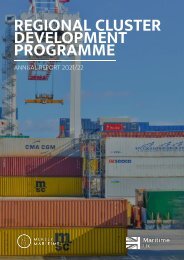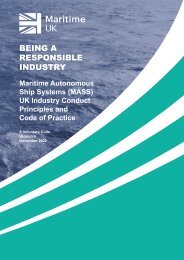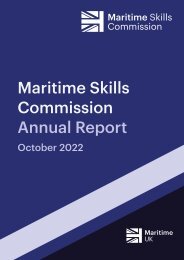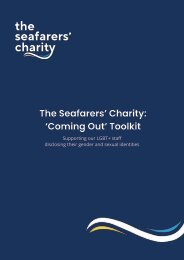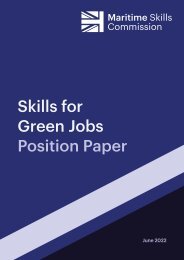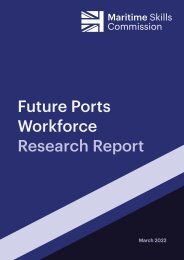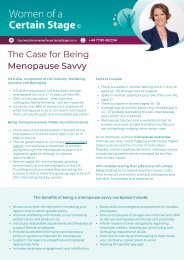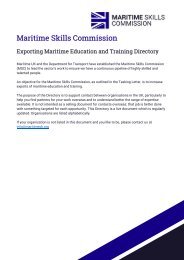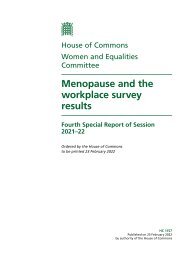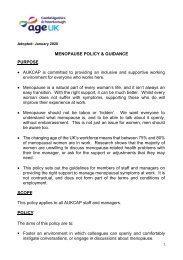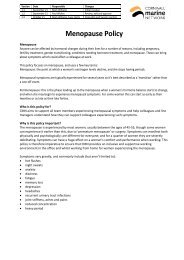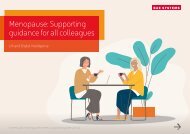Practical Guidance for Shipping Companies on Improving Mental Wellbeing
Create successful ePaper yourself
Turn your PDF publications into a flip-book with our unique Google optimized e-Paper software.
Nati<strong>on</strong>al Maritime Occupati<strong>on</strong>al Health and Safety Committee<br />
PRACTICAL GUIDANCE FOR SHIPPING COMPANIES ON IMPROVING MENTAL WELLBEING<br />
CONTENTS<br />
1<br />
2<br />
3<br />
4<br />
5<br />
6<br />
7<br />
8<br />
9<br />
10<br />
11<br />
12<br />
13<br />
14<br />
15<br />
16<br />
INTRODUCTION ........................................................................ 1<br />
MENTAL HEALTH AWARENESS ......................................................... 1<br />
A COMPANY CULTURE THAT PROMOTES GOOD MENTAL WELLBEING ..................... 2<br />
RISK ASSESSMENT AND MANAGEMENT ................................................ 3<br />
SHIPBOARD ENVIRONMENT ............................................................ 5<br />
FATIGUE ............................................................................... 5<br />
SOCIAL INTERACTION .................................................................. 6<br />
ALCOHOL ............................................................................. 7<br />
INTERNET ............................................................................. 7<br />
FOOD AND CATERING .................................................................. 8<br />
SHIPBOARD CULTURE . ................................................................. 9<br />
COMMITMENT FROM TOP MANAGEMENT ............................................... 10<br />
SUPPORT FROM COLLEAGUES ........................................................ 11<br />
BUILDING RESILIENCE ................................................................ 12<br />
FACTORS OUTSIDE THE COMPANY’S CONTROL.......................................... 14<br />
MENTAL HEALTH EDUCATION ......................................................... 15<br />
ANNEX A – EXAMPLE RISK ASSESSMENTS ............................................. 17<br />
ANNEX B – RESOURCES ......................................................................... 18<br />
ANNEX C – JOURNAL RESOURCES .............................................................. 19<br />
ANNEX D – ONBOARD POSTER . ........................................................ 20
Nati<strong>on</strong>al Maritime Occupati<strong>on</strong>al Health and Safety Committee<br />
PRACTICAL GUIDANCE FOR SHIPPING COMPANIES ON IMPROVING MENTAL WELLBEING<br />
1<br />
INTRODUCTION<br />
The Nati<strong>on</strong>al Maritime Occupati<strong>on</strong>al Health and Safety Committee (NMOHSC) issued<br />
guidelines to shipping companies <strong>on</strong> mental health awareness in 2018. The purpose of<br />
this document is to set out practical steps that companies may wish to take to promote<br />
the mental wellbeing of their employees. It is focused principally <strong>on</strong> seafarers but some<br />
parts of the guidance may be equally applicable to shore pers<strong>on</strong>nel.<br />
The NMOHSC does not endorse the examples as part of industry wide implementati<strong>on</strong> but<br />
presents them as practical steps that have proven beneficial to seafarer wellbeing in the<br />
specific circumstances where they have been applied.<br />
2<br />
MENTAL HEALTH AWARENESS<br />
Much like physical health we all have mental health, both of which can change over time.<br />
There<str<strong>on</strong>g>for</str<strong>on</strong>g>e, it is important to recognise that our mental wellbeing can fluctuate from feeling<br />
mentally well to mentally unwell. Mostly, we can manage our mental health by integrating<br />
positive practices to sustain a healthy mental state. It is possible <str<strong>on</strong>g>for</str<strong>on</strong>g> shipping companies<br />
to aid this and counterbalance negative stressors that might impact a pers<strong>on</strong>’s wellbeing.<br />
Sometimes a mental health c<strong>on</strong>diti<strong>on</strong> might need a diagnosis. People with a diagnosed<br />
mental illness can cope well and experience positive mental health.<br />
Most episodes of mental ill health are short lived and there are different types of<br />
early interventi<strong>on</strong>s that can help when a pers<strong>on</strong> is experiencing mild symptoms. Early<br />
interventi<strong>on</strong> and a holistic approach to wellbeing can negate more serious harm to<br />
the individual and those around them. As such, nurturing a working envir<strong>on</strong>ment that<br />
is c<strong>on</strong>ducive to good mental health, reduces stigma and encourages peer support is<br />
necessary.<br />
1
Nati<strong>on</strong>al Maritime Occupati<strong>on</strong>al Health and Safety Committee<br />
PRACTICAL GUIDANCE FOR SHIPPING COMPANIES ON IMPROVING MENTAL WELLBEING<br />
3<br />
A COMPANY CULTURE THAT PROMOTES GOOD MENTAL WELLBEING<br />
The best per<str<strong>on</strong>g>for</str<strong>on</strong>g>ming organisati<strong>on</strong>s are those where staff are healthy, motivated and<br />
focused. Where employees are valued and supported and feel that their work is<br />
meaningful and they have a stake in the success of the company, they are likely to have<br />
higher levels of mental wellbeing, as well as showing greater commitment and per<str<strong>on</strong>g>for</str<strong>on</strong>g>ming<br />
more effectively. This relati<strong>on</strong>ship between levels of staff wellbeing and motivati<strong>on</strong> and<br />
business per<str<strong>on</strong>g>for</str<strong>on</strong>g>mance is often called “employee engagement”.<br />
Business benefits include:<br />
• enhanced loyalty<br />
• enhanced commitment<br />
• enhanced morale<br />
• greater innovati<strong>on</strong><br />
• improved safety<br />
• higher productivity<br />
• greater profitability<br />
• reducti<strong>on</strong>s in sickness absence<br />
Fostering such a culture requires commitment from senior management that is visible,<br />
role modelled and communicated regularly. It involves encouraging fairness, teamwork,<br />
collaborati<strong>on</strong>, in<str<strong>on</strong>g>for</str<strong>on</strong>g>mati<strong>on</strong>-sharing, listening to staff and earning – rather than demanding<br />
– their respect and trust.<br />
<str<strong>on</strong>g>Practical</str<strong>on</strong>g> Example.<br />
A company published a comprehensive free<br />
resource <str<strong>on</strong>g>for</str<strong>on</strong>g> staff entitled “Care <str<strong>on</strong>g>for</str<strong>on</strong>g> People” which<br />
visibly dem<strong>on</strong>strated to the work<str<strong>on</strong>g>for</str<strong>on</strong>g>ce that their<br />
wellbeing was a priority and promoted positive<br />
<strong>Mental</strong> Health al<strong>on</strong>gside reducing stigma.<br />
2
Nati<strong>on</strong>al Maritime Occupati<strong>on</strong>al Health and Safety Committee<br />
PRACTICAL GUIDANCE FOR SHIPPING COMPANIES ON IMPROVING MENTAL WELLBEING<br />
4<br />
RISK ASSESSMENT AND MANAGEMENT<br />
<str<strong>on</strong>g>Companies</str<strong>on</strong>g> should view the promoti<strong>on</strong> of good mental wellbeing in the same way as any<br />
other health, safety or welfare issue – by undertaking risk assessments. <strong>Mental</strong> health<br />
difficulties have a wide variety of causes and many of these will be outside of a company’s<br />
c<strong>on</strong>trol. However, where there are factors affecting mental wellbeing that are under the<br />
company’s c<strong>on</strong>trol, the company should identify hazards i.e. any elements of working<br />
c<strong>on</strong>diti<strong>on</strong>s, or characteristics of the workplace, that may have a negative impact <strong>on</strong><br />
mental wellbeing. It should then c<strong>on</strong>sider who may be harmed, al<strong>on</strong>g with how. Having<br />
assessed the risks, possibly by using an appropriate risk assessment tool (see Annex A),<br />
the company should act in line with a recognised risk management plan.<br />
Wherever possible, companies should take steps to avoid the risks. This could be achieved<br />
by making changes to systems of work or living and working c<strong>on</strong>diti<strong>on</strong>s to circumvent the<br />
risk.<br />
If avoiding the risk is not possible or reas<strong>on</strong>ably practicable, ef<str<strong>on</strong>g>for</str<strong>on</strong>g>ts should focus <strong>on</strong><br />
c<strong>on</strong>trolling, mitigating, modifying or reducing the threat impact or likelihood (or both)<br />
through intermediate steps.<br />
Should there be no reas<strong>on</strong>ably practicable means of c<strong>on</strong>trolling or mitigating a risk, the<br />
company should take steps to minimise the adverse c<strong>on</strong>sequences that might arise from<br />
it. This may involve transferring the management of the risk to a third party or parties, if<br />
they are in the best positi<strong>on</strong> to manage the outcomes.<br />
Whenever carrying out risk assessments, the company should take a record of the findings<br />
and review the risk assessment at appropriate intervals.<br />
These risk assessment and risk management principles can be applied to mental<br />
wellbeing. Workplace c<strong>on</strong>diti<strong>on</strong>s that may have a negative impact should be identified<br />
and the above principles of risk assessment applied to them. It should be kept in mind that<br />
some c<strong>on</strong>diti<strong>on</strong>s may affect certain crew members more acutely than others. Because<br />
of this, the company should c<strong>on</strong>sider implementing individualised as well as collective<br />
soluti<strong>on</strong>s.<br />
Certain aspects of a seafarer’s life may impact negatively <strong>on</strong> mental health and will be<br />
difficult, if not impossible to change – l<strong>on</strong>g periods away from home, isolati<strong>on</strong>, l<strong>on</strong>g working<br />
hours and climatic variati<strong>on</strong>s associated with different parts of the world. However, it may<br />
3
Nati<strong>on</strong>al Maritime Occupati<strong>on</strong>al Health and Safety Committee<br />
PRACTICAL GUIDANCE FOR SHIPPING COMPANIES ON IMPROVING MENTAL WELLBEING<br />
be possible to make changes that might improve a seafarer’s mental c<strong>on</strong>diti<strong>on</strong>. <str<strong>on</strong>g>Companies</str<strong>on</strong>g><br />
should c<strong>on</strong>sider implementing the following measures to help bring these to light:<br />
• C<strong>on</strong>sultati<strong>on</strong>s with crew members<br />
• Training <str<strong>on</strong>g>for</str<strong>on</strong>g> seafarers in identifying and recognising stressful situati<strong>on</strong>s<br />
• Post-sick leave return to work interviews<br />
• Staff suggesti<strong>on</strong> schemes and surveys<br />
Workplace c<strong>on</strong>diti<strong>on</strong>s that should be examined include (but will not necessarily be limited to):<br />
• Tours of duty<br />
• Shift patterns<br />
• Frequency of port calls<br />
• Availability of shore leave<br />
• Crew accommodati<strong>on</strong><br />
• Recreati<strong>on</strong>al facilities<br />
• On-board food and catering<br />
• Communicati<strong>on</strong> facilities including internet access<br />
• Quality of shipboard management<br />
• “Macho” culture, or a culture where harassment and bullying<br />
take place unchecked<br />
• Crew compositi<strong>on</strong><br />
<str<strong>on</strong>g>Practical</str<strong>on</strong>g> Example.<br />
A seafarer was having difficulty sleeping and this was impacting<br />
negatively <strong>on</strong> their mental wellbeing. Following a c<strong>on</strong>sultati<strong>on</strong> with<br />
their General Practiti<strong>on</strong>er, they requested a change to their roster. They<br />
had been working a repeating pattern involving <strong>on</strong>e week of day work,<br />
followed by <strong>on</strong>e week off, then <strong>on</strong>e week of night work and then <strong>on</strong>e<br />
further week off.<br />
This was changed so they had less frequent adjustments between their<br />
day/night work. Their pattern became <strong>on</strong>e week of day work, followed<br />
by <strong>on</strong>e week off, then a further week of day work followed by <strong>on</strong>e week<br />
off, then <strong>on</strong>e week of night work, followed by <strong>on</strong>e week off, then a<br />
further week of night work followed by <strong>on</strong>e week off. The<br />
seafarer was able to sleep better and experienced<br />
improved mental health.<br />
4
Nati<strong>on</strong>al Maritime Occupati<strong>on</strong>al Health and Safety Committee<br />
PRACTICAL GUIDANCE FOR SHIPPING COMPANIES ON IMPROVING MENTAL WELLBEING<br />
5<br />
SHIPBOARD ENVIRONMENT<br />
Good quality com<str<strong>on</strong>g>for</str<strong>on</strong>g>table crew accommodati<strong>on</strong> which enables seafarers to make the<br />
most of their time off and obtain restful sleep, as well as recreati<strong>on</strong>al facilities appropriate<br />
<str<strong>on</strong>g>for</str<strong>on</strong>g> the ship’s size and trading pattern.<br />
Physical exercise is linked to mental wellbeing. Seafarers should be encouraged to do<br />
what they can to avoid a sedentary lifestyle where practicable.<br />
<str<strong>on</strong>g>Practical</str<strong>on</strong>g> Example.<br />
A company implemented upgrade initiatives including<br />
refurbishment of crew accommodati<strong>on</strong><br />
when dry docking as well as annual reviews of<br />
equipment and standardizati<strong>on</strong> of what needs to<br />
be <strong>on</strong> board.<br />
6<br />
FATIGUE<br />
Fatigue mitigati<strong>on</strong> and management is not simply a matter of compliance with regulati<strong>on</strong>s<br />
<strong>on</strong> minimum hours of rest. There is a wide range of factors that can mitigate or exacerbate<br />
seafarer fatigue and these are taken account of in the IMO’s Guidelines <strong>on</strong> Fatigue<br />
Mitigati<strong>on</strong> and Management 1 . Resource management can be a problem: sometimes<br />
senior officers are overburdened whilst juniors are under-utilised.<br />
<str<strong>on</strong>g>Practical</str<strong>on</strong>g> Examples.<br />
1. A company introduced electr<strong>on</strong>ic tools to their<br />
vessels to manage hours of work and rest. This<br />
reduced additi<strong>on</strong>al paperwork <str<strong>on</strong>g>for</str<strong>on</strong>g> the seafarer.<br />
2. A company issued quarterly articles <str<strong>on</strong>g>for</str<strong>on</strong>g><br />
its crews <strong>on</strong> how to manage fatigue.<br />
1 MSC.1/Circ.1598, 24 January 2019<br />
5
Nati<strong>on</strong>al Maritime Occupati<strong>on</strong>al Health and Safety Committee<br />
PRACTICAL GUIDANCE FOR SHIPPING COMPANIES ON IMPROVING MENTAL WELLBEING<br />
7<br />
SOCIAL INTERACTION<br />
There are many reports from seafarers stating that they feel isolated when <strong>on</strong> board. The<br />
tendency <str<strong>on</strong>g>for</str<strong>on</strong>g> seafarers to spend a lot of their rest time al<strong>on</strong>e in their bunks appears to be<br />
increasing, which reduces social interacti<strong>on</strong>. This is not necessarily a cause <str<strong>on</strong>g>for</str<strong>on</strong>g> c<strong>on</strong>cern<br />
– many seafarers prefer to retire to their cabins after having been <strong>on</strong> duty. However,<br />
measures to encourage interacti<strong>on</strong> should be c<strong>on</strong>sidered. These could include:<br />
• Provisi<strong>on</strong> of communal recreati<strong>on</strong>al facilities<br />
• Organisati<strong>on</strong> of activities that promote interacti<strong>on</strong> am<strong>on</strong>gst crew members<br />
• Facilitati<strong>on</strong> of pastoral visits to ships from providers of port welfare services<br />
<str<strong>on</strong>g>Practical</str<strong>on</strong>g> Example.<br />
A company pays a m<strong>on</strong>thly sum into a crew welfare fund<br />
to enable their seafarers to purchase items <str<strong>on</strong>g>for</str<strong>on</strong>g> recreati<strong>on</strong>.<br />
Karaoke machines are popular, al<strong>on</strong>g with basketballs,<br />
football kits and interactive computer games.<br />
ITF SEAFARERS’ TRUST ‘STILL AT SEA’ PROJECT © NEIL PATRICK M SISON.<br />
6
Nati<strong>on</strong>al Maritime Occupati<strong>on</strong>al Health and Safety Committee<br />
PRACTICAL GUIDANCE FOR SHIPPING COMPANIES ON IMPROVING MENTAL WELLBEING<br />
8<br />
ALCOHOL<br />
Seafarers <strong>on</strong> many ships are prohibited from c<strong>on</strong>suming alcoholic beverages whilst <strong>on</strong><br />
board and it is <str<strong>on</strong>g>for</str<strong>on</strong>g> c<strong>on</strong>siderati<strong>on</strong> whether banning alcohol completely <strong>on</strong> deep sea ships<br />
makes a positive c<strong>on</strong>tributi<strong>on</strong> to safety. It is worth c<strong>on</strong>sidering whether a company may<br />
have a safer operati<strong>on</strong> if it allows seafarers to c<strong>on</strong>sume alcoholic drinks <strong>on</strong> board under<br />
c<strong>on</strong>trolled c<strong>on</strong>diti<strong>on</strong>s i.e. the amount and the times at which it may be c<strong>on</strong>sumed are<br />
restricted (in order to ensure that crew members do not have alcohol in their systems<br />
when reporting <str<strong>on</strong>g>for</str<strong>on</strong>g> duty) than by banning alcohol outright. The latter may encourage<br />
seafarers to drink to excess when taking shore leave. On short sea voyages bans <strong>on</strong> alcohol<br />
c<strong>on</strong>sumpti<strong>on</strong> are fully justified.<br />
<str<strong>on</strong>g>Practical</str<strong>on</strong>g> Example.<br />
A company that operates a dry ship culture relaxed its ban <strong>on</strong><br />
seafarers c<strong>on</strong>suming alcoholic drinks whilst <strong>on</strong> shore leave<br />
when their vessel was in port, c<strong>on</strong>sidering that permitting limited<br />
quantities of alcoholic drinks whilst off the ship would benefit<br />
the wellbeing of their crews by increased b<strong>on</strong>ding outside of the<br />
workplace. This was specifically <str<strong>on</strong>g>for</str<strong>on</strong>g> those who were not due to<br />
per<str<strong>on</strong>g>for</str<strong>on</strong>g>m duties within a reas<strong>on</strong>able time frame so as not to be<br />
detrimental to the safety of the ship.<br />
9<br />
INTERNET<br />
Future generati<strong>on</strong>s of seafarers will not be familiar with a world without the internet and<br />
any companies that fail to make provisi<strong>on</strong> <strong>on</strong> board will struggle with their recruitment.<br />
However not all companies are in a positi<strong>on</strong> to provide high bandwidths at all times.<br />
<str<strong>on</strong>g>Practical</str<strong>on</strong>g> Example.<br />
A company provided free internet allowance <str<strong>on</strong>g>for</str<strong>on</strong>g><br />
seafarers and additi<strong>on</strong>al bandwidth upgrades.<br />
7
Nati<strong>on</strong>al Maritime Occupati<strong>on</strong>al Health and Safety Committee<br />
PRACTICAL GUIDANCE FOR SHIPPING COMPANIES ON IMPROVING MENTAL WELLBEING<br />
10<br />
FOOD AND CATERING<br />
A nutritious diet can influence mental as well as physical health. Some companies have<br />
introduced programmes to improve the diet of their crews and these have produced<br />
impressive results and been very well received by seafarers. (See Annex B <str<strong>on</strong>g>for</str<strong>on</strong>g> more<br />
in<str<strong>on</strong>g>for</str<strong>on</strong>g>mati<strong>on</strong> <strong>on</strong> mental wellbeing and diet).<br />
It is possible to use <strong>on</strong>board meal planning and provisi<strong>on</strong>ing to reflect the cultural and<br />
religious backgrounds of crew members, to promote inclusi<strong>on</strong> and individual wellbeing.<br />
This is included in the Ships’ Cook Certificate training 2 but catering staff should be<br />
encouraged to actively incorporate it into their working practice.<br />
<str<strong>on</strong>g>Practical</str<strong>on</strong>g> Examples.<br />
1. A chef encouraged crew members to in<str<strong>on</strong>g>for</str<strong>on</strong>g>m them of a<br />
favourite home cooked meal and ascertained a suitable day<br />
where each crew member’s favourite was provided. It was<br />
dependent <strong>on</strong> crew size and length of voyage. This scheme<br />
invigorated dialogue am<strong>on</strong>gst the crew who would explain the<br />
significance of the dish which <str<strong>on</strong>g>for</str<strong>on</strong>g>tified team b<strong>on</strong>ding. On l<strong>on</strong>g<br />
voyages it gave crew members food reminiscent of home to<br />
look <str<strong>on</strong>g>for</str<strong>on</strong>g>ward to.<br />
2. A crew member’s birthday was recognised while <strong>on</strong> voyage.<br />
Celebratory food related to the nati<strong>on</strong>ality of the crew member<br />
is a positive token of recogniti<strong>on</strong> and rein<str<strong>on</strong>g>for</str<strong>on</strong>g>ces morale as<br />
well as social interacti<strong>on</strong>.<br />
2 MLC Regulati<strong>on</strong> 3.2, MSN 1846 (M)<br />
8
Nati<strong>on</strong>al Maritime Occupati<strong>on</strong>al Health and Safety Committee<br />
PRACTICAL GUIDANCE FOR SHIPPING COMPANIES ON IMPROVING MENTAL WELLBEING<br />
11<br />
SHIPBOARD CULTURE<br />
If seafarers d<strong>on</strong>’t feel that they can discuss matters with their colleagues or report safety<br />
c<strong>on</strong>cerns, it can negatively affect their mental wellbeing. The UK’s social partners have<br />
been at the <str<strong>on</strong>g>for</str<strong>on</strong>g>efr<strong>on</strong>t of ef<str<strong>on</strong>g>for</str<strong>on</strong>g>ts to rid the industry of harassment and bullying and their<br />
work has been taken up at EU and global level.<br />
<str<strong>on</strong>g>Practical</str<strong>on</strong>g> Examples.<br />
1. A company that employs crew members of differing<br />
nati<strong>on</strong>alities sought to engage with their n<strong>on</strong>-British<br />
nati<strong>on</strong>als by providing in<str<strong>on</strong>g>for</str<strong>on</strong>g>mati<strong>on</strong> about company activities<br />
to promote good mental health and remedial services in the<br />
native languages of the crew members c<strong>on</strong>cerned.<br />
2. A company introduced a management training programme at<br />
all levels within its organisati<strong>on</strong>, focusing up<strong>on</strong> empathy, just<br />
& fair culture and improving staff engagement and ownership<br />
of tasks and moving away from micro-management.<br />
9
Nati<strong>on</strong>al Maritime Occupati<strong>on</strong>al Health and Safety Committee<br />
PRACTICAL GUIDANCE FOR SHIPPING COMPANIES ON IMPROVING MENTAL WELLBEING<br />
12<br />
COMMITMENT FROM TOP MANAGEMENT<br />
As with a company policy <strong>on</strong> any subject, a str<strong>on</strong>g and dem<strong>on</strong>strable commitment from<br />
top management is essential if the policy is to be effective and win the c<strong>on</strong>fidence of<br />
seafarers. Top management should there<str<strong>on</strong>g>for</str<strong>on</strong>g>e take measures to show that seafarers are<br />
encouraged to discuss their mental health and will not suffer any detriment, or be poorly<br />
thought of, if they do so.<br />
Just as an authoritarian, hectoring management style may be perceived as a <str<strong>on</strong>g>for</str<strong>on</strong>g>m of<br />
bullying, it can have a serious negative impact <strong>on</strong> the mental health of those workers<br />
who report to such a manager. By c<strong>on</strong>trast managers who show empathy and trust<br />
in their staff and support <str<strong>on</strong>g>for</str<strong>on</strong>g> company mental health policies are likely to have more<br />
successful teams with much reduced incidence of mental health problems. Managers<br />
should be provided with training in appropriate styles that are c<strong>on</strong>ducive to improving<br />
work per<str<strong>on</strong>g>for</str<strong>on</strong>g>mance and mental health and wellbeing. Such styles should engage the<br />
team regularly and encourage team members to raise c<strong>on</strong>cerns about living and working<br />
c<strong>on</strong>diti<strong>on</strong>s, workplace health and safety and any mental health issues that are of c<strong>on</strong>cern<br />
to them.<br />
<str<strong>on</strong>g>Practical</str<strong>on</strong>g> Examples.<br />
1. In <strong>on</strong>e company, senior managers made short<br />
films of no more than five minutes’ durati<strong>on</strong><br />
in which they spoke candidly about their own<br />
mental health c<strong>on</strong>cerns. These were shown<br />
to all staff. It delivered a str<strong>on</strong>g message<br />
that, as far as the company was c<strong>on</strong>cerned,<br />
there was no stigma attached to mental<br />
health c<strong>on</strong>cerns and mental illnesses.<br />
2. A company ensured that mental health<br />
<str<strong>on</strong>g>for</str<strong>on</strong>g>med a part of all seafarer c<strong>on</strong>ferences<br />
to show c<strong>on</strong>tinued rein<str<strong>on</strong>g>for</str<strong>on</strong>g>cement<br />
of its importance.<br />
PHOTO BY BILLEASY ON UNSPLASH<br />
10
Nati<strong>on</strong>al Maritime Occupati<strong>on</strong>al Health and Safety Committee<br />
PRACTICAL GUIDANCE FOR SHIPPING COMPANIES ON IMPROVING MENTAL WELLBEING<br />
13<br />
SUPPORT FROM COLLEAGUES<br />
Trained mental health first aiders am<strong>on</strong>gst a ship’s crew can make a significant positive<br />
impact, provided that it is part of an holistic company policy <strong>on</strong> mental wellbeing. Their<br />
role can be preventive as well as remedial, provided they are adept in spotting the warning<br />
signs that are likely to indicate the presence of a mental health problem.<br />
It is important <str<strong>on</strong>g>for</str<strong>on</strong>g> the company to ensure that mental health first aiders are themselves<br />
provided with support, particularly if they are affected by anything raised and if they need<br />
support signposting the individual to the suitable outlets <str<strong>on</strong>g>for</str<strong>on</strong>g> help should it be necessary.<br />
They should never be made to feel that it is their pers<strong>on</strong>al missi<strong>on</strong> to resolve a mental<br />
health problem in a colleague. First aid means just that – in the same way as a pers<strong>on</strong><br />
trained in providing medical first aid is not qualified to undertake medical diagnosis or<br />
provide advanced treatment to a patient.<br />
<str<strong>on</strong>g>Practical</str<strong>on</strong>g> Examples.<br />
1. A company funded mental health first aid training of several staff<br />
members and established a network <str<strong>on</strong>g>for</str<strong>on</strong>g> them to share experiences, in<br />
order that they are not working in isolati<strong>on</strong>.<br />
2. A company encouraged their staff to an<strong>on</strong>ymously nominate colleagues<br />
they would feel most com<str<strong>on</strong>g>for</str<strong>on</strong>g>table talking to regarding their<br />
mental health. This helped develop a stigma free envir<strong>on</strong>ment and<br />
trained staff members who would naturally be approachable.<br />
3. A vessel adopted techniques that stem from positive psychology such<br />
as random acts of kindness. Members were encouraged to per<str<strong>on</strong>g>for</str<strong>on</strong>g>m<br />
small acts of care giving without the expectati<strong>on</strong> of return such as<br />
making a hot beverage <str<strong>on</strong>g>for</str<strong>on</strong>g> a colleague.<br />
11
Nati<strong>on</strong>al Maritime Occupati<strong>on</strong>al Health and Safety Committee<br />
PRACTICAL GUIDANCE FOR SHIPPING COMPANIES ON IMPROVING MENTAL WELLBEING<br />
14<br />
BUILDING RESILIENCE<br />
Resilience refers to an individual’s capacity to adapt in the face of challenging<br />
circumstances and stressful events whilst maintaining stable mental wellbeing, rather<br />
than just <strong>on</strong>e’s ability to “bounce back”. Resilience is not a pers<strong>on</strong>ality trait – it can be<br />
learned and training courses are available. The training encourages participants to focus<br />
<strong>on</strong> positive aspects of their lives, to think positively, to avoid worrying excessively about<br />
matters that they cannot c<strong>on</strong>trol, to set goals and rise to challenges and to identify ways<br />
of reducing stress that work <str<strong>on</strong>g>for</str<strong>on</strong>g> them. People can build resilience through assertiveness<br />
training, learning relaxati<strong>on</strong> techniques and rewarding themselves <str<strong>on</strong>g>for</str<strong>on</strong>g> their achievements.<br />
<str<strong>on</strong>g>Companies</str<strong>on</strong>g> can assist by providing or facilitating training in assertiveness and c<strong>on</strong>flict<br />
resoluti<strong>on</strong> and by adopting a just and fair culture – ensuring that individuals do not feel<br />
blame <str<strong>on</strong>g>for</str<strong>on</strong>g> things that have g<strong>on</strong>e wr<strong>on</strong>g but are not their fault.<br />
The Seven C’s of Resilience<br />
O F R ESILIE N C E<br />
• C<strong>on</strong>trol<br />
• Competence<br />
• Coping<br />
• C<strong>on</strong>fidence<br />
• C<strong>on</strong>necti<strong>on</strong><br />
• Character<br />
• C<strong>on</strong>tributi<strong>on</strong><br />
The lifestyle habits foundati<strong>on</strong>al to resilience are regular exercise and good quality sleep<br />
which rein<str<strong>on</strong>g>for</str<strong>on</strong>g>ces the importance of ensuring that adequate rest and the opportunity <str<strong>on</strong>g>for</str<strong>on</strong>g><br />
regular exercise are facilitated <strong>on</strong>board.<br />
12
Nati<strong>on</strong>al Maritime Occupati<strong>on</strong>al Health and Safety Committee<br />
PRACTICAL GUIDANCE FOR SHIPPING COMPANIES ON IMPROVING MENTAL WELLBEING<br />
<str<strong>on</strong>g>Practical</str<strong>on</strong>g> Examples.<br />
1. One company introduced resilience training activities <strong>on</strong><br />
board ship which included active participati<strong>on</strong> and assisted<br />
crew in taking note of their pers<strong>on</strong>al wellbeing <strong>on</strong> board.<br />
This included discussi<strong>on</strong>s <strong>on</strong> how they could support each<br />
other and what activities they would enjoy collectively. It<br />
was important to plan the activities and write them down<br />
as a commitment to each other.<br />
2. One company implemented gratitude exercises. This<br />
encouraged crew members to vocalise positive elements<br />
of their day to other members of crew and rein<str<strong>on</strong>g>for</str<strong>on</strong>g>ced that<br />
they would be listened to, whatever their rank.<br />
13
Nati<strong>on</strong>al Maritime Occupati<strong>on</strong>al Health and Safety Committee<br />
PRACTICAL GUIDANCE FOR SHIPPING COMPANIES ON IMPROVING MENTAL WELLBEING<br />
15<br />
FACTORS OUTSIDE THE COMPANY’S CONTROL<br />
Many factors that c<strong>on</strong>tribute to suboptimal levels of mental wellbeing have causes that<br />
are external to the company. They could be related to family, relati<strong>on</strong>ships, illnesses,<br />
addicti<strong>on</strong>s, bereavements and other stress-inducing life events, including historical<br />
traumas. There are however, measures that companies can take to alleviate or mitigate<br />
the detrimental effects.<br />
<str<strong>on</strong>g>Companies</str<strong>on</strong>g> should facilitate access to c<strong>on</strong>fidential third-party helplines, to enable<br />
seafarers to discuss any c<strong>on</strong>cerns they might have with trained and sympathetic<br />
counsellors. However such provisi<strong>on</strong> should complement, rather than replace, the<br />
company’s commitments as described in these guidelines.<br />
<str<strong>on</strong>g>Companies</str<strong>on</strong>g> should permit employees who have been bereaved, or are experiencing a<br />
domestic event that is causing serious c<strong>on</strong>cern, time at home and, if they are <strong>on</strong> board,<br />
early repatriati<strong>on</strong>.<br />
Tools that can assist seafarers in recognising signs of suboptimal mental wellbeing in<br />
themselves and their colleagues include:<br />
• Self-help guides<br />
• <strong>Mental</strong> Health First Aid / Awareness training with a marine focus<br />
• Self-care programmes covering (but not limited to) educati<strong>on</strong>, nutriti<strong>on</strong>,<br />
physical exercise, relaxati<strong>on</strong>, sleeping<br />
• Journaling (See Annex C)<br />
<str<strong>on</strong>g>Companies</str<strong>on</strong>g> should keep in mind that employees who become trained as mental health<br />
first-aiders or ambassadors may themselves require assistance and/or counselling if this<br />
role brings them into c<strong>on</strong>tact with distressing situati<strong>on</strong>s. They should never be made to<br />
feel that it is their pers<strong>on</strong>al missi<strong>on</strong> to resolve somebody else’s mental health issues.<br />
<str<strong>on</strong>g>Practical</str<strong>on</strong>g> Example.<br />
A company c<strong>on</strong>ducted a survey to ascertain the biggest <str<strong>on</strong>g>for</str<strong>on</strong>g>m of stress<br />
<strong>on</strong> board. The results showed that work related stress accounted<br />
<str<strong>on</strong>g>for</str<strong>on</strong>g> approximately 25%, while <strong>on</strong> board c<strong>on</strong>flict, challenges at home,<br />
l<strong>on</strong>eliness and distance from family were also significant. Some of<br />
these other stress factors could be helped by company involvement<br />
<str<strong>on</strong>g>for</str<strong>on</strong>g> example the Employee Assistance Program they had in place<br />
could be utilised by family members.<br />
14
Nati<strong>on</strong>al Maritime Occupati<strong>on</strong>al Health and Safety Committee<br />
PRACTICAL GUIDANCE FOR SHIPPING COMPANIES ON IMPROVING MENTAL WELLBEING<br />
16<br />
MENTAL HEALTH EDUCATION<br />
Depressi<strong>on</strong> is a comm<strong>on</strong> mental illness and <strong>on</strong>e that most companies should prepare <str<strong>on</strong>g>for</str<strong>on</strong>g><br />
within their work <str<strong>on</strong>g>for</str<strong>on</strong>g>ce. A pers<strong>on</strong> is diagnosed as clinically depressed if they present at<br />
least two symptoms of depressi<strong>on</strong> <str<strong>on</strong>g>for</str<strong>on</strong>g> two weeks. There<str<strong>on</strong>g>for</str<strong>on</strong>g>e, it is possible <str<strong>on</strong>g>for</str<strong>on</strong>g> depressi<strong>on</strong><br />
to develop and be undiagnosed throughout a voyage. It is possible to recover, though some<br />
individuals may go through phases. A mentally healthy workplace can reduce the risk of<br />
depressive episodes.<br />
Suicide is c<strong>on</strong>sidered the most serious crisis associated with mental ill health there<str<strong>on</strong>g>for</str<strong>on</strong>g>e it<br />
should be a priority <str<strong>on</strong>g>for</str<strong>on</strong>g> mental health policy within a company. All suicides are c<strong>on</strong>sidered<br />
as preventable. <strong>Mental</strong> health first aid / awareness courses educate with a structured<br />
strategy regarding this topic.<br />
Although it is important to acknowledge that suicide is a potential risk factor in an<br />
individual experiencing chr<strong>on</strong>ic depressi<strong>on</strong> or certain other c<strong>on</strong>diti<strong>on</strong>s, it should be borne<br />
in mind that this is a rare outcome and that treating any seafarer who comes <str<strong>on</strong>g>for</str<strong>on</strong>g>ward<br />
suffering <str<strong>on</strong>g>for</str<strong>on</strong>g>m poor mental health as a potential suicide risk will not be c<strong>on</strong>ducive to<br />
reducing stigma or encouraging openness.<br />
Voyage extensi<strong>on</strong> is proven to impact psychological wellbeing. <str<strong>on</strong>g>Companies</str<strong>on</strong>g> should<br />
recognise this and put measures into place to support seafarers if extensi<strong>on</strong> is unavoidable.<br />
Language surrounding comm<strong>on</strong>ly used mental health related phrases should be<br />
c<strong>on</strong>sidered to reduce stigma within the company. The use of “commit” suicide implies it is<br />
a criminal act, and thus discourages people from vocalising suicidal thoughts.<br />
It is beneficial <str<strong>on</strong>g>for</str<strong>on</strong>g> a company to understand what support is available <str<strong>on</strong>g>for</str<strong>on</strong>g> their crews.<br />
This support can range from helplines, journaling aids, apps or training signposts. It is<br />
important that this support is compiled into a tool kit of resources which are visible and<br />
easily accessible <strong>on</strong> board <str<strong>on</strong>g>for</str<strong>on</strong>g> crew without c<strong>on</strong>stant internet access. (See Annex D).<br />
15
Nati<strong>on</strong>al Maritime Occupati<strong>on</strong>al Health and Safety Committee<br />
PRACTICAL GUIDANCE FOR SHIPPING COMPANIES ON IMPROVING MENTAL WELLBEING<br />
LIZ MARAMI – AGAINST THE TIDE FOUNDATION<br />
<str<strong>on</strong>g>Practical</str<strong>on</strong>g> Examples.<br />
1. A company implemented workshops with seafarers and<br />
shoreside marine HR to bridge the gap and address topic areas.<br />
2. A company carried out a risk assessment covering leading<br />
mental health issues applicable to seafarers such as fatigue,<br />
sleep disorders, anxiety, stress, depressi<strong>on</strong> and addicti<strong>on</strong>.<br />
3. A company displayed posters <strong>on</strong> board to signpost seafarers to<br />
suitable support outlets. (See Annex D).<br />
UK Chamber of <str<strong>on</strong>g>Shipping</str<strong>on</strong>g>, Nautilus Internati<strong>on</strong>al and Nati<strong>on</strong>al Uni<strong>on</strong> of Rail, Maritime and Transport Workers<br />
March 2021<br />
16
ANNEX A – EXAMPLE RISK ASSESSMENTS 3<br />
Company name:<br />
Assessment carried out by:<br />
Date of next review:<br />
Date assessment was carried out:<br />
Risk<br />
People<br />
potentially<br />
at risk? (Risk<br />
level 1-5)<br />
Measures<br />
currently in place<br />
to eliminate or<br />
mitigate the risk<br />
Required acti<strong>on</strong><br />
to eliminate, or<br />
mitigate risk<br />
Pers<strong>on</strong>(s)<br />
resp<strong>on</strong>sible<br />
Time frame<br />
<str<strong>on</strong>g>for</str<strong>on</strong>g> acti<strong>on</strong><br />
Completed<br />
Social • All crew (3) • Crew Mess • Identify a social • Master<br />
Isolati<strong>on</strong> • Shared Meal events facilitator • Social Facilitator<br />
times<br />
• Regular events<br />
organised<br />
• L<strong>on</strong>e workers (4) • Identificati<strong>on</strong> of • Crewing/Ships<br />
• L<strong>on</strong>e members of crew members at manager in<br />
language/cultural/ higher risk levels collaborati<strong>on</strong> with<br />
gender or other • M<strong>on</strong>itoring of Senior officers<br />
groups (5) isolati<strong>on</strong> and • Senior Officer<br />
wellbeing through • HR/Peer<br />
identified senior Supporters<br />
• Peer Support<br />
mechanisms<br />
enacted<br />
3 <strong>Mental</strong>ly Healthy Ships – ISWAN<br />
“<strong>Mental</strong>ly Healthy Ships” provides an extensive list of Risks to <strong>Mental</strong> Health <str<strong>on</strong>g>for</str<strong>on</strong>g> Seafarers as well as in depth<br />
recommendati<strong>on</strong>s <str<strong>on</strong>g>for</str<strong>on</strong>g> the implementati<strong>on</strong> of policy and practice to promote mental health <strong>on</strong> board.<br />
Template produced by ISWAN<br />
17
ANNEX B – RESOURCES<br />
Apps (all available <str<strong>on</strong>g>for</str<strong>on</strong>g> free)<br />
Wellness at Sea<br />
Sailors’ Society<br />
Shoreleave – Finding a Seafarer Centre<br />
ITF<br />
Maritime <strong>Wellbeing</strong> Programme<br />
Maritime <strong>Wellbeing</strong><br />
Catch it – Making sense of moods<br />
Universities of Liverpool and Manchester<br />
WorryTree – Journalling<br />
WorryTree – NHS approved<br />
Relax Melodies – Fatigue and Sleep Hygiene<br />
Relax Melodies – c<strong>on</strong>tains in-app purchases<br />
Food and Catering<br />
Nutriti<strong>on</strong> and <strong>Mental</strong> Health – How to balance<br />
a diet <str<strong>on</strong>g>for</str<strong>on</strong>g> a mental health c<strong>on</strong>diti<strong>on</strong><br />
Food <str<strong>on</strong>g>for</str<strong>on</strong>g> the Brain Foundati<strong>on</strong><br />
How to manage mood with food (Video)<br />
Mind<br />
Training<br />
Seas the Mind <strong>Mental</strong> Health First Aid –<br />
Superyacht and hospitality at sea<br />
ISWAN - <strong>Mental</strong> Health Awareness Training<br />
Variety of levels from crew awareness to<br />
management level pers<strong>on</strong>nel<br />
Resilience, <strong>Wellbeing</strong> and Awareness<br />
Maritime <strong>Wellbeing</strong> Programme<br />
Maritime <strong>Wellbeing</strong><br />
Steps to Positive <strong>Mental</strong> Health<br />
Internati<strong>on</strong>al Seafarers’ Welfare and<br />
Assistance Network<br />
<strong>Wellbeing</strong> at Sea: A Pocket Guide <str<strong>on</strong>g>for</str<strong>on</strong>g> Seafarers<br />
Maritime Coastguard Agency<br />
Care <str<strong>on</strong>g>for</str<strong>on</strong>g> People – Resilience Program<br />
Shell<br />
Leadership Skills <str<strong>on</strong>g>for</str<strong>on</strong>g> Crew <strong>Wellbeing</strong> (Video<br />
Modules)<br />
Maritime <strong>Wellbeing</strong><br />
Understanding Depressi<strong>on</strong> – The Black Dog<br />
World Health Organisati<strong>on</strong> - 2003<br />
Further Reading<br />
Seafarer <strong>Mental</strong> Health Study<br />
ITF Seafarers’ Trust & Yale University - 2019<br />
Seafarers’ <strong>Mental</strong> Health and <strong>Wellbeing</strong><br />
IOSH and Cardiff University 2019<br />
Maritime UK – <strong>Mental</strong> Health Network<br />
Collaborative <strong>Mental</strong> Health plat<str<strong>on</strong>g>for</str<strong>on</strong>g>m<br />
<strong>Wellbeing</strong> Less<strong>on</strong>s from Survey <strong>on</strong> Seafarer<br />
<strong>Wellbeing</strong> and COVID-19 Pandemic<br />
Lloyd’s Register – 2020<br />
Merchant Navy Training Board & Maritime<br />
Charities Group<br />
A Standard <str<strong>on</strong>g>for</str<strong>on</strong>g> Seafarers’ <strong>Mental</strong> Health<br />
Awareness and <strong>Wellbeing</strong> Training<br />
18
ANNEX C – JOURNAL RESOURCES<br />
Pers<strong>on</strong>al <strong>Wellbeing</strong> Weekly Check-in sheet.<br />
For original download please c<strong>on</strong>tact hello@kellyscause.com<br />
19
ANNEX D – ONBOARD POSTER<br />
ISWAN <strong>Mental</strong> Health Training<br />
Variety of levels from crew awareness to Management Level Pers<strong>on</strong>nel<br />
ISWAN poster downloadable <str<strong>on</strong>g>for</str<strong>on</strong>g> free here<br />
20


